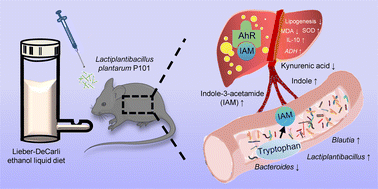Indole-3-acetamide from gut microbiota activated hepatic AhR and mediated the remission effect of Lactiplantibacillus plantarum P101 on alcoholic liver injury in mice†
Abstract
Alcoholic liver disease is a prevalent condition resulting from excessive alcohol consumption, characterized by hepatic lipid accumulation and inflammation. This study delved into the protective effects and mechanisms of L. plantarum P101 on alcoholic liver injury in mice. As a result, L. plantarum P101 intervention reduced ALT and AST release, indicative of hepatocyte injury alleviation, while enhancing the activity of the antioxidant enzymes SOD and CAT. A reduction in pro-inflammatory cytokine TNF-α and an increase in anti-inflammatory cytokine IL-10 levels were observed in the L. plantarum P101-intervened mouse liver, signifying reduced inflammation within the mice. Furthermore, L. plantarum P101 intervention altered the gut microbial composition, primarily marked by an increase in Bacteroidota abundance, along with significant enrichment of beneficial bacteria, including Coprostanoligenes, Blautia and Lactiplantibacillus. Correlation analysis unveiled connections between serum tryptophan metabolites and the altered gut microbiota genera, suggesting that gut microbiota-driven effects may extend to extraintestinal organs through their metabolites. Intriguingly, serum indole-3-acetamide (IAM) was elevated by L. plantarum P101-regulated gut microbiota. Subsequently, the role of IAM in ameliorating alcoholic injury was explored using HepG2 cells, where it bolstered cell viability and attenuated EtOH-induced oxidative damage. Concomitantly, IAM activated the gene and protein expression of AhR in cells. Likewise, hepatic AhR expression in mice subjected to L. plantarum P101 significantly up-regulated, possibly instigated by gut microbiota-mediated IAM. Collectively, L. plantarum P101 orchestrates a modulation of gut microbiota and its metabolites, particularly IAM, to activate AhR, thereby alleviating alcoholic liver injury.



 Please wait while we load your content...
Please wait while we load your content...